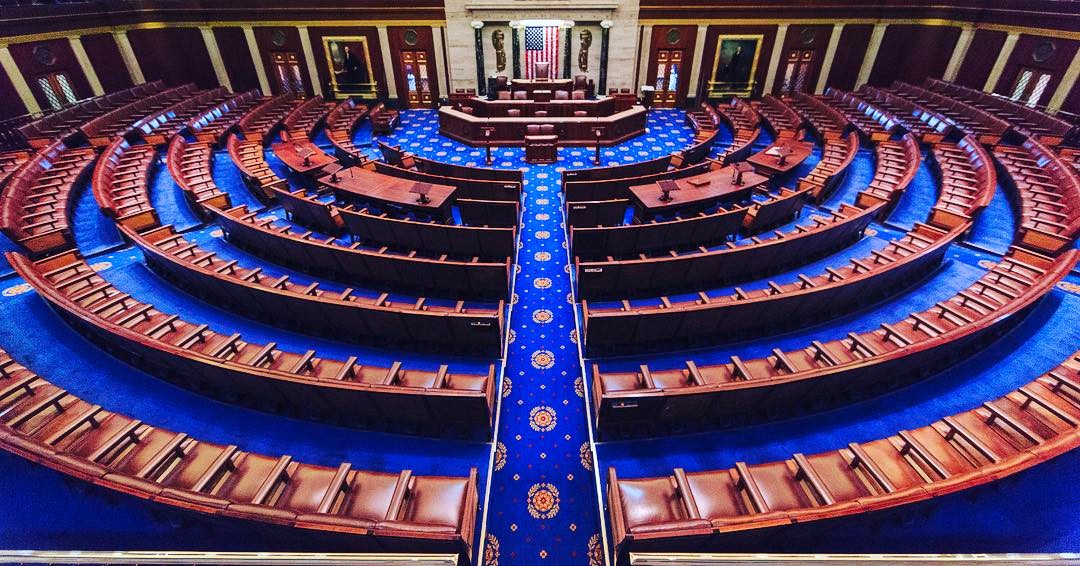The COVID-19 pandemic has brought unprecedented challenges for leaders around the world. Yet, the U.S. Congress currently lacks a clear emergency preparedness plan for maintaining its operations during this crisis.
Yesterday, groups from across the political spectrum, including the Bipartisan Policy Center, College to Congress, Demand Progress, Democracy Fund Voice, Issue One, R Street Institute, POPVOX CEO Marci Harris, and Georgetown University’s Lorelei Kelly, called on House and Senate leadership to fix this vulnerability by adopting plans to maintain congressional operations during the COVID-19 pandemic.
“At this critical moment, the American people need their elected leaders in Congress to be on the job and taking appropriate action to respond to the current pandemic. Congress should quickly adopt an emergency preparedness plan that respects the requirements of the Constitution while ensuring the safety of members and staff alike. Our democratic republic needs a plan in place so that, even in a crisis, members are able to fulfill their constitutional duties,” said Meredith McGehee, executive director of Issue One.
“Americans expect Congress to lead during a crisis. While COVID-19 poses unique and, in some ways, unprecedented challenges for legislating, modern technology gives Congress the ability to adapt in ways it never could during prior disruptions like 9/11 or the anthrax attacks,” said Michael Thorning, Associate Director of Governance at the Bipartisan Policy Center. “Neither chamber can afford to bury their heads in the sand. They need to act now or it will be even more difficult down the road.”
“The facts are clear: COVID-19 is not going to disappear anytime soon. Our representative democracy needs a working Congress. The chambers need to adopt technology and rules changes that enable members and staff to do the public’s work while staying safe,” said Kevin Kosar, Vice President of Research Partnerships at R Street Institute.
“This crisis makes it all the more important that Congress is able to exercise its constitutional responsibility to represent and serve the American people. We encourage both chambers to adopt secure and transparent technological systems for continued operations. We also urge House and Senate leadership to provide clear guidance on remote work and other safety protocols to protect the Capitol Hill workforce and their families. As this crisis continues to unfold, we are depending on our leaders in Congress to take all necessary steps to carry on with essential legislative business,” said Lara Flint, Governance Program Director at Democracy Fund Voice.
“Whenever possible, Americans should work remotely while the coronavirus makes it unsafe or unwise to gather in person. So too should Congress work remotely whenever possible, as they should serve as an example of what we should be doing, not be an exception to the rule,” said Daniel Schuman, policy director, Demand Progress.
“The pandemic makes clear that the first priority of any employer must be to protect all staff and that this ethic should also be embedded in a continuity of operations plan. The U.S. Congress is no exception, yet thus far we’ve seen no consistent, systemwide response to safeguard employees or to understand our current circumstance as a warning shot — and act immediately to create a continuity plan. Indeed, Congress must wake up and act. Our democracy depends on it,” said Lorelei Kelly, Director of Congressional Modernization, Beeck Center for Social Impact + Innovation at Georgetown University.
The letter outlines concrete steps Congress can take right now to resume essential business and provide much-needed clarity for Members of Congress, their staffs, and constituents.
These include:
- Limiting to the number of people who must be physically present in the Capitol complex, and providing clear guidance to those who are
- Encouraging the use – and providing clear guidelines for using – technology that will allow a significant portion of congressional business to continue remotely, particularly virtual meetings for Committee hearings and oversight
- Maintaining the transparency and accessibility of public proceedings like hearings
- Preparing for a lengthier disruption to its operations as a result of this pandemic
Such emergency plans need to be outlined — and socialized with Members of Congress — immediately to ensure that, even if the virus were to return this year or next, Congress has strong contingency plans in place to continue essential business.
Read the full letter to congressional leadership here.



